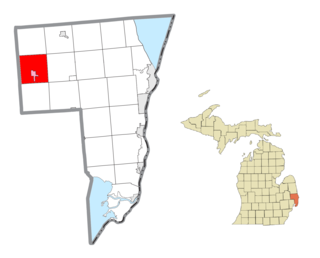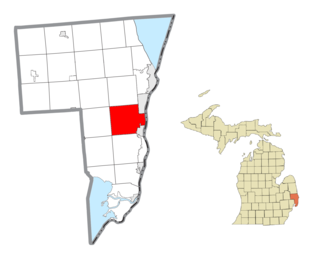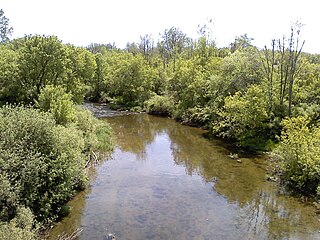Related Research Articles

St. Clair County is a county located in the U.S. state of Michigan and bordering the west bank of the St. Clair River. As of the 2020 census, the population was 160,383. It is the 13th-most populous county in the state. The county seat is Port Huron, located at the north end of the St. Clair River at Lake Huron. The county was created September 10, 1820, and its government was organized in 1821. It is located northeast of Detroit. It is considered by the State of Michigan to be a part of The Thumb, a peninsula that is surrounded by Lake Huron in the east-central area of the state. This area is sometimes dubbed the Blue Water Area.

Clinton Township is a charter township in Macomb County in the U.S. state of Michigan. A northern suburb of Detroit, Clinton Township is located about 22 miles (35 km) northeast of downtown Detroit. As of the 2020 census, the township had a population of 100,513, making it the most populous township in Michigan, and the state's 8th-most populous community overall.

Shelby Charter Township, officially the Charter Township of Shelby, is a charter township located in Macomb County in the U.S. state of Michigan. The township is an affluent northern suburb of Detroit. As of the 2020 census, the population was 79,408, up from 73,804 in 2010. Shelby Charter Township is one of the fastest-growing communities in Metro Detroit.

Mussey Township is a civil township of St. Clair County in the U.S. state of Michigan. The population was 4,234 at the 2020 Census.

St. Clair Township is a civil township of St. Clair County in the U.S. state of Michigan. The population was 7,085 at the 2020 Census. The city of St. Clair is located near the southeast corner of the township.

The Huron River is a 130-mile-long (210 km) river in southeastern Michigan, rising out of the Huron Swamp in Springfield Township in northern Oakland County and flowing into Lake Erie, as it forms the boundary between present-day Wayne and Monroe counties. Thirteen parks, game areas, and recreation areas are associated with the river, which passes through the cities of Dexter, Ann Arbor, Ypsilanti, Belleville, Flat Rock and Rockwood that were developed along its banks.
Stanley Griswold was a Democratic-Republican politician from Ohio. He served in the U.S. Senate.

The Clinton River is a river in southeastern Michigan in the United States. It is named in honor of DeWitt Clinton, who was governor of New York from 1817 to 1823.

Southeast Michigan, also called southeastern Michigan, is a region in the Lower Peninsula of Michigan that is home to a majority of the state's businesses and industries as well as slightly over half of the state's population, most of whom are concentrated in Metro Detroit.

James M. Edmunds was a politician from the U.S. state of Michigan.

Origen Drew Richardson was an American lawyer and politician in the U.S. state of Michigan and in the Nebraska Territory. He served in the Michigan House of Representatives and was the fourth lieutenant governor of Michigan.
George Alonzo Coe was an American politician from the U.S. state of Michigan. He served as the 11th lieutenant governor of Michigan.
Benjamin Franklin Hawkins Witherell was a jurist in the U.S. state of Michigan. He served as a justice of the Michigan Supreme Court in 1857.

Morgan Bates was a politician from the U. S. state of Michigan.
Warren Township is a former civil township of Macomb County in the U.S. state of Michigan. Most of the township became the city of Warren.

The 1st Michigan Legislature, consisting of the Michigan Senate and the Michigan House of Representatives, met in Detroit in three sessions between November 2, 1835, and July 26, 1836, during the first year of Stevens T. Mason's governorship of the (prospective) state.
Isaac Monfore or Monfort was an American politician who served two terms in the Michigan House of Representatives in Michigan's first years of statehood.
Jacob Summers was an American politician who served in the Michigan House of Representatives and Michigan Senate.
Alexander Tackels, also Tackles or Tacles, was an American politician who served two terms in the Michigan House of Representatives.
References
- Bingham, Stephen D. (2005) [1888]. "s.v. Dexter Mussey". Early history of Michigan, with biographies of state officers, members of Congress, judges and legislators. Ann Arbor, Mich.: University of Michigan Library. p. 485. Retrieved 2008-02-23.
- Eldredge, Robert F. (2005) [1905]. "Chapter XXIII Romeo". Past and present of Macomb County, Michigan. Ann Arbor, Mich.: University of Michigan Library. p. 685. Retrieved 2008-02-23.
- Jenks, William Lee (2005) [1912]. "Chapter XVI Cities and Villages". St. Clair County, Michigan, its history and its people. Ann Arbor, Mich.: University of Michigan Library. p. 245. Retrieved 2008-02-23.
- Leeson, Michael A. (2005) [1882]. History of Macomb County, Michigan. Ann Arbor, Mich.: University of Michigan Library. Retrieved 2008-02-23.
